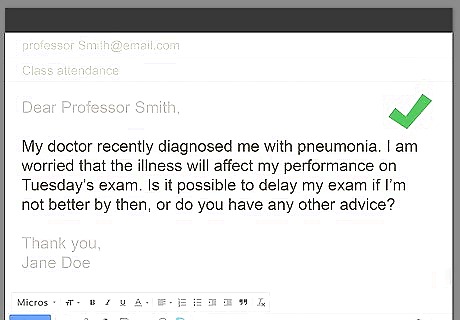
views
Make a prioritized list of what you have to study.

Getting organized this way ensures you study what’s most important. Write down all the upcoming exams you have to study for or all the topics that are going to be on a single exam and rank them in order of importance. That way, if you don’t have the energy to study everything, you at least cover the most important stuff first. For example, say your college midterms are coming up. If you have an “A” in History 101 and a “C” in Geology 101 so far this semester, prioritize studying for your geology exam over studying for your history exam. Or, if you only have to study for a History exam, write down a list of all the readings and assignments that are going to be on the test. Then, rank them with the topics you’re least familiar with at the top and the stuff you know best at the bottom.
Work in a clean, comfortable environment.

Studying when you’re sick is hard enough, so make yourself cozy, at least. Dedicate a comfortable space to studying while you’re sick, such as a couch with a coffee table in front of it for all your notes or a comfy chair at a desk that’s not too brightly lit. Just don’t study in bed or you might be a little too tempted to doze off! It’s totally okay, and even encouraged, to bundle up inside a blanket when you’re revising for an exam while sick!
Study materials that don’t strain your eyes or brain.

You don’t want to give yourself a headache or dry your eyes out. Review readings in books or paper study notes instead of information on screens, if possible. Try to save the memorizing of tons of information for when you’re feeling a bit better. For example, filling out a worksheet based on a chapter of reading from a book is a better choice than staring at a bunch of notes you took on your tablet and trying to memorize them.
Make flashcards and test yourself.

This is an active, engaging way to study when you’re ill. Get some notecards or pieces of paper and write key terms and concepts on 1 side of them. On the other side, write definitions and explanations. Go through the cards and quiz yourself on everything to help you retain the information better. You could also do a video call with a friend or group of friends studying for the same exam and test each other with flashcards, or just present some of the information to each other to help each other out.
Take breaks every 30 minutes.

It's important to pace yourself to avoid exhaustion when you’re ill. Study for 30 minutes, then take a 5- to 30-minute break until you feel ready to continue. It may help to switch subjects or topics after every break in order to stay focused and avoid burning out on studying just 1 thing. You could also try working for 25 minutes, then taking a 5-minute break. Do this 4 times for a total of 2 hours, then take a longer break for 15 to 30 minutes.
Get up and move around.

A little movement can clear your head and maybe help decongest you. Whenever it’s time for a short break, get up and go for a 5-minute walk outside to get some fresh air. Or, if you don’t want to go outside, just stand up and stretch out your muscles for a few minutes to wake up. If you’re feeling really tired and don’t want to move around much at all, you can at least crack open a window to get some fresh air.
Drink lots of fluids.

Staying hydrated is vital to fighting off a cold or flu. Keep a glass of water or herbal tea with you while you study and sip on it whenever you feel thirsty. Hot liquids like tea can also help clear congestion and soothe a sore throat. Natural fruit juices like orange juice can also help hydrate you. Plus, orange juice and other fruit juices have vitamin C, which might help you fight off your sickness.
Eat light, comforting snacks and meals.

The right food helps get you through your studying without crashing. When you take breaks or at meal times, eat healthy options like soup, yogurt, and oatmeal. These fill you up and comfort you while you’re studying while sick. Broth-based soups, like chicken noodle soup, are particularly soothing and light when you’re feeling under the weather.
Take the appropriate medication.

Medicine can help you get through your study session. Take any prescription or over-the-counter medications at the prescribed intervals to keep things like congestion, headaches, body aches, and other pain and discomfort at bay. However, stay away from anything that makes you drowsy. If you don’t have any medicine, visit your school’s doctor or nurse to get some or ask a local pharmacist for recommendations.
Don’t forget to rest and care for yourself.

You’re not going to get better if you don’t take care of yourself. If you feel like you’re not making progress anymore after studying for a while, lie down and take a nap! Listen to your body and don’t push yourself too hard. Also, definitely skip any non-essential extracurricular or social activities until you’re better. Save all your precious energy for studying, for now.
Ask for a deferred exam if you can’t study.

Sometimes, studying when you’re sick just feels impossible. Most schools have some kind of procedure for allowing ill students to postpone their exams. Talk to your professor or administration and explain that you’re feeling way too bad to study, and ask them what they need from you to allow you to take the exam at a later date. For example, some institutions might just require you to get a certified medical note from a doctor. Other schools might not obligate you to go to the doctor’s office, in which case you might just have to fill out some paperwork to formally request a deferred exam.














Comments
0 comment